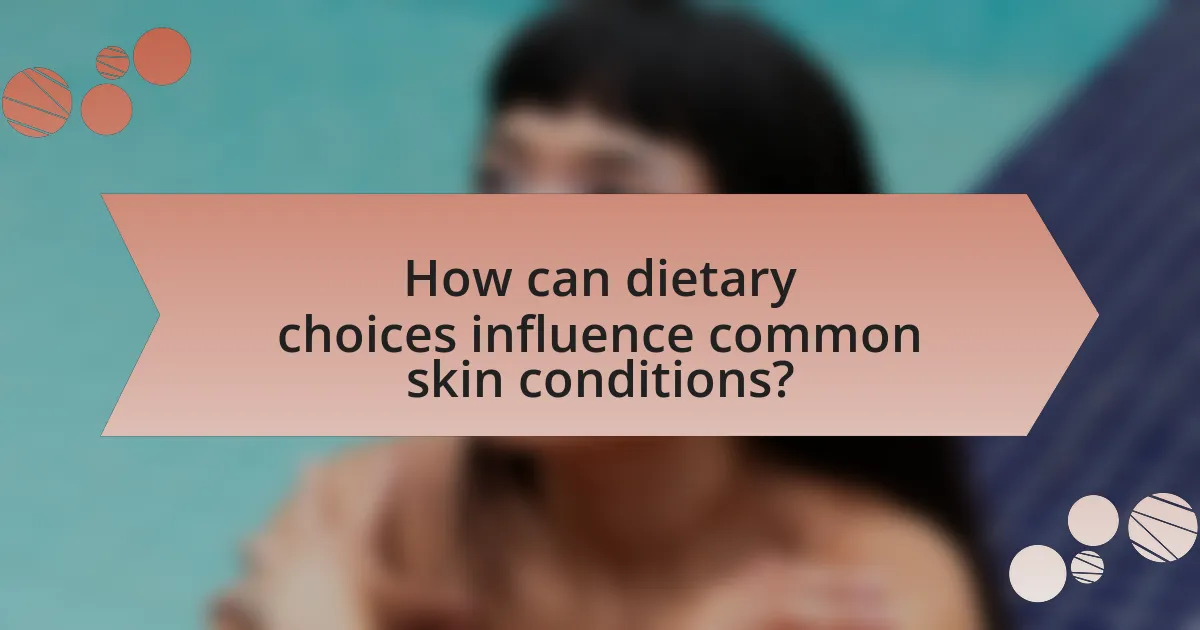The article explores the critical connection between nutrition and skin health, emphasizing how essential nutrients such as vitamins A, C, and E, omega-3 fatty acids, and antioxidants contribute to skin integrity, hydration, and repair. It discusses the impact of dietary choices on skin appearance and function, highlighting the role of hydration and specific dietary components in maintaining healthy skin. Additionally, the article addresses the effects of nutrient deficiencies on skin conditions, the importance of antioxidants in combating oxidative stress, and practical dietary tips for improving skin health. Overall, it underscores the significance of a balanced diet in promoting optimal skin vitality and managing common skin issues.

What is the connection between nutrition and skin health?
Nutrition directly influences skin health by providing essential nutrients that support skin structure and function. Vitamins such as A, C, and E, along with minerals like zinc and omega-3 fatty acids, play critical roles in maintaining skin integrity, hydration, and repair. For instance, a study published in the Journal of Investigative Dermatology found that vitamin C is vital for collagen synthesis, which is crucial for skin elasticity and firmness. Additionally, a balanced diet rich in antioxidants helps combat oxidative stress, reducing signs of aging and promoting a healthier complexion. Therefore, adequate nutrition is fundamental for optimal skin health and appearance.
How does nutrition impact skin appearance and function?
Nutrition significantly impacts skin appearance and function by providing essential nutrients that support skin health. Nutrients such as vitamins A, C, and E, along with omega-3 fatty acids, contribute to skin hydration, elasticity, and overall appearance. For instance, vitamin C is crucial for collagen synthesis, which helps maintain skin structure and firmness, while omega-3 fatty acids reduce inflammation and can alleviate conditions like acne and eczema. Studies have shown that diets rich in antioxidants, found in fruits and vegetables, can protect the skin from oxidative stress and premature aging. Therefore, a balanced diet directly correlates with improved skin health and appearance.
What nutrients are essential for maintaining healthy skin?
Essential nutrients for maintaining healthy skin include vitamins A, C, D, and E, as well as omega-3 fatty acids and antioxidants. Vitamin A supports skin cell production and repair, while vitamin C is crucial for collagen synthesis, which enhances skin elasticity. Vitamin D plays a role in skin barrier function, and vitamin E acts as an antioxidant, protecting skin cells from damage. Omega-3 fatty acids help maintain skin hydration and reduce inflammation. Research indicates that a deficiency in these nutrients can lead to various skin issues, highlighting their importance in skin health.
How do deficiencies in certain nutrients affect skin health?
Deficiencies in certain nutrients can lead to various skin health issues, including dryness, irritation, and increased susceptibility to infections. For example, a lack of vitamin A can result in dry, flaky skin, while insufficient vitamin C may impair collagen production, leading to wrinkles and sagging. Additionally, deficiencies in essential fatty acids can disrupt the skin barrier, causing moisture loss and inflammation. Research indicates that inadequate zinc levels can hinder wound healing and contribute to acne development. These nutrient deficiencies directly impact skin integrity and overall appearance, highlighting the importance of a balanced diet for maintaining healthy skin.
Why is hydration important for skin health?
Hydration is crucial for skin health because it maintains skin elasticity, prevents dryness, and supports overall skin function. Well-hydrated skin appears plumper and more youthful, while dehydration can lead to flakiness, irritation, and increased visibility of fine lines. Studies indicate that adequate water intake can improve skin hydration levels, enhancing the skin’s barrier function and reducing trans-epidermal water loss. For instance, a study published in the Journal of Clinical and Aesthetic Dermatology found that increased water consumption significantly improved skin hydration and elasticity in participants.
What role does water play in skin elasticity and appearance?
Water is essential for maintaining skin elasticity and appearance. Adequate hydration helps to keep skin cells plump and promotes a healthy barrier function, which prevents moisture loss. Studies indicate that well-hydrated skin appears more youthful, with improved elasticity and reduced signs of aging, such as fine lines and wrinkles. For instance, a study published in the Journal of Cosmetic Dermatology found that increased water intake significantly improved skin hydration and elasticity in participants. This evidence underscores the critical role of water in enhancing skin health and overall appearance.
How can hydration levels be effectively monitored?
Hydration levels can be effectively monitored through methods such as urine color assessment, body weight tracking, and the use of hydration monitoring devices. Urine color is a practical indicator; pale yellow suggests adequate hydration, while darker shades indicate dehydration. Body weight changes before and after exercise can also reflect fluid loss, providing a quantitative measure of hydration status. Additionally, wearable hydration monitors utilize sensors to track sweat loss and fluid balance, offering real-time data on hydration levels. These methods are supported by research indicating that consistent monitoring can help maintain optimal hydration, which is crucial for skin health and overall well-being.

What specific dietary components promote skin health?
Specific dietary components that promote skin health include antioxidants, omega-3 fatty acids, vitamins A, C, and E, and zinc. Antioxidants, such as those found in fruits and vegetables, help combat oxidative stress, which can damage skin cells. Omega-3 fatty acids, prevalent in fatty fish and flaxseeds, support skin barrier function and reduce inflammation. Vitamins A, C, and E are crucial for skin repair, collagen production, and protection against UV damage. Zinc, found in nuts and seeds, plays a role in skin healing and inflammation reduction. Studies have shown that diets rich in these components can lead to improved skin appearance and health.
Which vitamins are crucial for skin vitality?
Vitamins A, C, D, and E are crucial for skin vitality. Vitamin A promotes skin cell production and repair, while Vitamin C is essential for collagen synthesis, which maintains skin elasticity. Vitamin D supports skin barrier function and immune response, and Vitamin E acts as an antioxidant, protecting skin cells from damage. Research indicates that deficiencies in these vitamins can lead to various skin issues, highlighting their importance in maintaining healthy skin.
How does Vitamin C contribute to collagen production?
Vitamin C is essential for collagen production as it acts as a cofactor for the enzymes prolyl and lysyl hydroxylase, which are necessary for the stabilization and cross-linking of collagen fibers. This stabilization is crucial for maintaining the structural integrity of collagen, which is a primary component of skin, tendons, and connective tissues. Research indicates that a deficiency in Vitamin C can lead to impaired collagen synthesis, resulting in weakened skin and increased susceptibility to damage. For instance, a study published in the “American Journal of Clinical Nutrition” by Carr and Maggini (2017) highlights that adequate Vitamin C intake is vital for optimal collagen formation and overall skin health.
What are the effects of Vitamin E on skin protection?
Vitamin E provides significant skin protection by acting as a powerful antioxidant that neutralizes free radicals, which can cause skin damage and accelerate aging. Research indicates that Vitamin E helps to maintain skin barrier function, enhances hydration, and reduces inflammation, contributing to overall skin health. A study published in the Journal of Investigative Dermatology found that topical application of Vitamin E can improve skin texture and reduce the appearance of scars, further supporting its protective effects.
What role do antioxidants play in skin health?
Antioxidants play a crucial role in skin health by protecting skin cells from oxidative stress caused by free radicals. Free radicals can result from environmental factors such as UV radiation and pollution, leading to premature aging and skin damage. Antioxidants, including vitamins C and E, neutralize these free radicals, thereby reducing inflammation and promoting skin repair. Research indicates that topical application of antioxidants can improve skin texture and reduce signs of aging, as evidenced by a study published in the Journal of Investigative Dermatology, which found that vitamin C can enhance collagen synthesis and improve skin elasticity.
How do antioxidants combat oxidative stress in skin cells?
Antioxidants combat oxidative stress in skin cells by neutralizing free radicals, which are unstable molecules that can damage cellular structures. When skin cells are exposed to environmental stressors like UV radiation and pollution, free radicals are generated, leading to oxidative stress that can accelerate aging and skin disorders. Antioxidants, such as vitamins C and E, donate electrons to free radicals, stabilizing them and preventing cellular damage. Research indicates that topical application of antioxidants can enhance skin barrier function and improve overall skin appearance, as demonstrated in studies showing reduced signs of photoaging and improved skin hydration.
Which foods are rich in antioxidants beneficial for skin?
Foods rich in antioxidants beneficial for skin include berries, dark chocolate, nuts, green tea, and leafy greens. Berries, such as blueberries and strawberries, are high in vitamin C and flavonoids, which help protect skin from oxidative stress. Dark chocolate contains flavonoids that improve skin hydration and texture. Nuts, particularly walnuts and almonds, provide vitamin E, which is essential for skin health. Green tea is rich in polyphenols that reduce inflammation and protect against UV damage. Leafy greens, like spinach and kale, are packed with vitamins A, C, and E, contributing to skin repair and rejuvenation.

How can dietary choices influence common skin conditions?
Dietary choices significantly influence common skin conditions by affecting inflammation, hydration, and nutrient availability. For instance, a diet high in refined sugars and unhealthy fats can exacerbate acne by increasing insulin levels, which in turn promotes sebum production and inflammation. Conversely, foods rich in antioxidants, such as fruits and vegetables, can reduce oxidative stress and inflammation, potentially improving conditions like eczema and psoriasis. Research published in the Journal of the American Academy of Dermatology indicates that omega-3 fatty acids, found in fish and flaxseeds, can help reduce the severity of inflammatory skin conditions. Thus, the composition of one’s diet plays a crucial role in skin health and the management of various skin disorders.
What dietary changes can help manage acne?
Dietary changes that can help manage acne include reducing the intake of high-glycemic foods, dairy products, and saturated fats while increasing the consumption of fruits, vegetables, and omega-3 fatty acids. High-glycemic foods, such as white bread and sugary snacks, can spike insulin levels, which may lead to increased oil production and acne. A study published in the American Journal of Clinical Nutrition found that a low-glycemic diet significantly reduced acne lesions in participants. Additionally, dairy has been linked to acne due to hormones present in milk, as noted in research from the Journal of the American Academy of Dermatology. Incorporating more fruits and vegetables provides essential vitamins and antioxidants that support skin health, while omega-3 fatty acids, found in fish and flaxseeds, have anti-inflammatory properties that can help reduce acne severity.
How do high-glycemic foods affect acne development?
High-glycemic foods can exacerbate acne development by increasing insulin levels, which in turn stimulates the production of sebum and promotes inflammation. Research indicates that diets high in refined carbohydrates, such as white bread and sugary snacks, lead to a spike in blood sugar levels, triggering a cascade of hormonal responses that can worsen acne. A study published in the American Journal of Clinical Nutrition found that young men who consumed a low-glycemic diet experienced a significant reduction in acne lesions compared to those on a high-glycemic diet. This evidence supports the link between high-glycemic foods and the aggravation of acne.
What anti-inflammatory foods can reduce acne symptoms?
Anti-inflammatory foods that can reduce acne symptoms include fatty fish, nuts, seeds, fruits, and vegetables. Fatty fish, such as salmon and mackerel, are rich in omega-3 fatty acids, which have been shown to decrease inflammation and improve skin health. Nuts and seeds, particularly walnuts and flaxseeds, also provide omega-3s and antioxidants that can help combat acne. Fruits like berries and oranges are high in vitamins and antioxidants, which can reduce inflammation. Leafy greens and cruciferous vegetables, such as spinach and broccoli, contain compounds that support skin health and reduce inflammation. Studies indicate that diets rich in these foods can lead to lower levels of acne and improved skin conditions.
How does nutrition affect aging skin?
Nutrition significantly affects aging skin by influencing its elasticity, hydration, and overall appearance. A diet rich in antioxidants, vitamins, and healthy fats can combat oxidative stress and inflammation, which are key contributors to skin aging. For instance, vitamin C, found in fruits like oranges and strawberries, is essential for collagen synthesis, helping maintain skin firmness. Omega-3 fatty acids, present in fish and flaxseeds, support skin barrier function and hydration. Studies have shown that diets high in processed sugars and unhealthy fats can accelerate skin aging by promoting glycation, a process that damages collagen and elastin fibers. Therefore, a balanced diet can play a crucial role in maintaining youthful skin.
What foods can help reduce the appearance of wrinkles?
Foods that can help reduce the appearance of wrinkles include those rich in antioxidants, healthy fats, and vitamins. Berries, such as blueberries and strawberries, are high in antioxidants that combat oxidative stress, which contributes to skin aging. Fatty fish, like salmon, provide omega-3 fatty acids that maintain skin elasticity and hydration. Leafy greens, such as spinach and kale, are packed with vitamins A, C, and K, which support skin health and collagen production. Nuts, particularly walnuts and almonds, contain healthy fats and vitamin E, which protect skin from damage. Additionally, avocados are rich in healthy fats and vitamins that promote skin moisture and elasticity. These foods collectively contribute to a healthier skin appearance by providing essential nutrients that combat the signs of aging.
How does a balanced diet support skin regeneration?
A balanced diet supports skin regeneration by providing essential nutrients that promote cell repair and renewal. Nutrients such as vitamins A, C, and E, along with omega-3 fatty acids, play critical roles in maintaining skin health. For instance, vitamin A is vital for skin cell production, while vitamin C aids in collagen synthesis, which is crucial for skin elasticity and structure. Omega-3 fatty acids help maintain the skin’s lipid barrier, preventing moisture loss and enhancing overall skin hydration. Studies have shown that diets rich in these nutrients can lead to improved skin texture and reduced signs of aging, demonstrating the direct impact of nutrition on skin regeneration.
What are practical tips for improving skin health through nutrition?
To improve skin health through nutrition, consume a balanced diet rich in antioxidants, vitamins, and healthy fats. Foods high in antioxidants, such as berries, nuts, and green leafy vegetables, help combat oxidative stress, which can damage skin cells. Incorporating vitamins A, C, and E from sources like carrots, citrus fruits, and almonds supports skin repair and regeneration. Omega-3 fatty acids found in fatty fish, flaxseeds, and walnuts enhance skin barrier function and hydration. Additionally, staying hydrated by drinking adequate water is essential for maintaining skin elasticity and overall health. Research indicates that a diet rich in these nutrients can lead to improved skin appearance and reduced signs of aging.
How can one create a balanced diet for optimal skin health?
To create a balanced diet for optimal skin health, one should focus on incorporating a variety of nutrient-rich foods that support skin function and appearance. This includes consuming fruits and vegetables high in antioxidants, such as berries, spinach, and carrots, which help combat oxidative stress and inflammation. Additionally, including healthy fats from sources like avocados, nuts, and fatty fish provides essential fatty acids that maintain skin hydration and elasticity.
Moreover, adequate protein intake from lean meats, legumes, and dairy is crucial for collagen production, which is vital for skin structure. Staying hydrated by drinking sufficient water also plays a key role in maintaining skin moisture and overall health. Research indicates that diets rich in vitamins A, C, E, and omega-3 fatty acids are associated with improved skin conditions and appearance, highlighting the importance of a well-rounded nutritional approach for skin health.
What are some common dietary mistakes to avoid for better skin?
Common dietary mistakes to avoid for better skin include excessive sugar intake, high consumption of processed foods, and inadequate hydration. Excessive sugar can lead to glycation, which damages collagen and elastin, resulting in premature aging. High processed food consumption often leads to inflammation and skin issues due to unhealthy fats and additives. Inadequate hydration can cause dryness and exacerbate skin conditions, as water is essential for maintaining skin elasticity and overall health.
